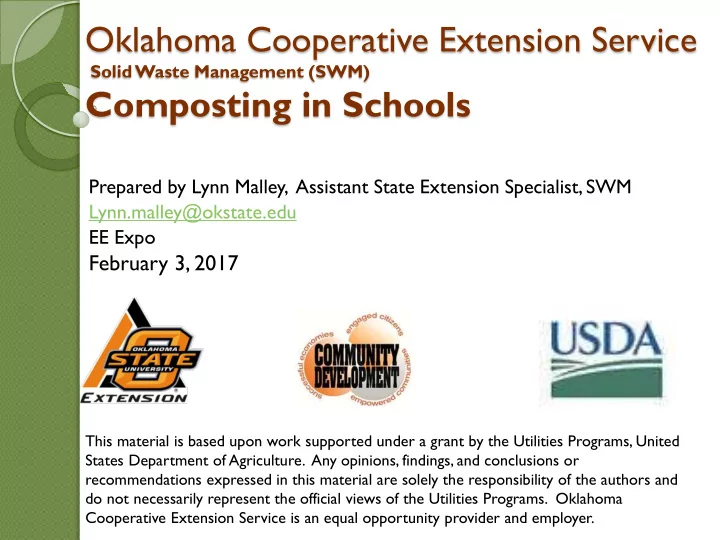

Oklahoma Cooperative Extension Service Solid Waste Management (SWM) Composting in Schools Prepared by Lynn Malley, Assistant State Extension Specialist, SWM Lynn.malley@okstate.edu EE Expo February 3, 2017 This material is based upon work supported under a grant by the Utilities Programs, United States Department of Agriculture. Any opinions, findings, and conclusions or recommendations expressed in this material are solely the responsibility of the authors and do not necessarily represent the official views of the Utilities Programs. Oklahoma Cooperative Extension Service is an equal opportunity provider and employer.
What is Extension? Educators to “educate the citizens” - 300 in offices in all 77 OK counties - Generally Ag, Community/Family, 4-H - 300 based on the Stillwater campus - Specific specialties – research and education Created over 100 years ago at land grant universities all over the US
What Is the Purpose of the Solid Waste Management Grant? Provide technical assistance to communities that are ◦ Small ◦ Rural ◦ Native American ◦ Other What does that mean? ◦ Partnering with these communities to improve SWM ◦ Building bridges among those interested in SWM Funded by USDA Rural Development
Featured Activity - Organics Waste Diversion from Landfills Hot topic nationally 20-40% of landfill materials are food waste and yard waste These produce higher amounts of methane gas Large parts of Oklahoma are food deserts We/schools can use the food scraps We/schools can compost the waste Schools can grow gardens www.facebook.com/compostok www.facebook.sustainableliving
What is Composting? Natural decomposition of organic materials by microorganisms • Insects • Worms • Bacteria • Fungi, etc. Requires organic materials and some water May or may not require air
Compost Happens Or not contained… Whether contained….
Compost Reduces Waste Between 20% and 40% of landfill content is organic waste.
Methods of Composting Bin, Tumbler, Chamber, or home made System Commercial Scale
Windrows at CommonWealth Gardens OKC
Static Compost Pile at the OKC Zoo
4 Bin System with Pallets
Pallet Bins from Growing a Greener World http://www.growingagreenerworld.com/e pisode225/
Compost Inputs and T ools Inputs T ools Fruits and vegetables Rake Straw Shovel Grass Clippings ? Bin Leaves ? worms
Compost Steps
High Carbon - Brown Dead Leaves Straw Paper
High Nitrogen - Green Produce Scraps Grass Clippings Coffee Grounds Manure
Organic Matter Great stuff!! • Promotes microbial growth • Improves soil tilth (workability) • Promotes root development • Improves soil aeration & drainage • Improves water retention in sandy soils • Lessens soil compaction • Etc. Etc. Etc. Organic Matter • Matter that comes from a once- living organism • Is capable of decay • Is made up of organic compounds
Finished Compost • The decomposed remnants of organic matter • Soil Amendment • Stable • Dark Brown or Black • Earthy Smell
Use of Compost Soil amendment 50-100 lbs/100 sq. ft. At planting in garden In planting hole or trench Component of potting mix 30-50% of mix Mulching 2-3” thick Lawn • Soil amendment before planting • Top dress use up to ¼” per year
Reasons to Compost: Food Waste = Food for People, Animals, and Plants Advantages ◦ Good, local food for Ugly veggies people in smaller, Overripe crops underserved areas Compost ◦ Extra unusable food for animals ◦ Easily, locally made compost ◦ Less need for infrastructure ◦ More independence ◦ Interested?
Schools are opportune locations for composting Composting is a great teaching tool
Since We Are Talking about STEM ◦ Science Where does the school’s food waste go, organic lawn waste? Trash > landfill > methane gas How else could the food and yard waste be used What happens when the compost feedstock breaks down How to make that breakdown happen slower or faster
T echnology How does a landfill work How is it built What byproducts are produced What machinery is used to run a landfill How are computers used in managing modern landfills
Engineering How is a modern landfill built Why does there have to be a specific slope angle Why is nightly cover required What is the system of piping that runs through a landfill How does the leachate pond function What is a waste-to-energy landfill
Math nitrogen/carbon ratio materials needed to build a 3 x 3 or 4 x 4 bin differences in output of compost of the different sized bins Money saved by diverting food and leaves from the trash?
Wala! It’s the cycle of life! Composting is a great tool for reconnecting kids to the earth – they get to make it Growing things in soil with compost added is a great way to make a garden and grow food ◦ The food can be used in the cafeteria or sent home with the kids ◦ The waste from the food goes back into the compost pile
Resources OCES – Lynn Malley ◦ https://www.facebook.com/OkstateSolidWasteMa nagement ◦ https://www.facebook.com/compostok http://www.lifelab.org/composting/ http://compostingcouncil.org/wp/wp- content/uploads/2015/06/Composting-at- School-0307.pdf http://schoolgardenproject.org/wp- content/uploads/2013/06/Cafeteria- Composting-Manual-for-printing.pdf
Master Composters The program The benefits ◦ Training coming for ◦ Use of real food waste trainers in small towns ◦ Production of a great around the state growing medium for ◦ Based on the Master local gardens Gardener program Schools ◦ Trainers will donate Senior Centers Small Communities 20-40 hours of ◦ Production of richer training to others in their area soil for absorbing and holding water
Questions? Lynn Malley Assistant State Extension Specialist Solid Waste Management Lynn.malley@okstate.edu 405.744.9827 W
Recommend
More recommend